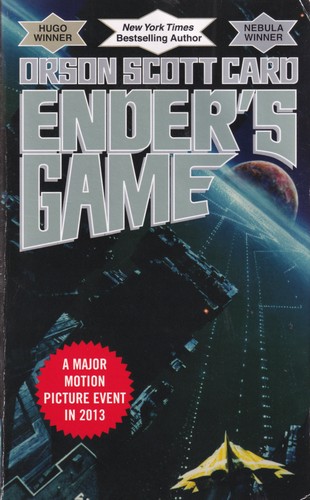Trae reviewed Ender's Game by Orson Scott Card (Ender Saga, #1)
Review of "Ender's Game" on 'Goodreads'
5 stars
Ender’s Game has long since become a staple in the Science Fiction community and has often been touted a literary classic. Written by Orson Scott Card, Ender’s Game touches the reader in a way that many books have tried and failed. A completely character driven story, Card weaves a tail that sucks you in by the sheer desire to know what happens to Ender and how he will make it through. Poor Ender.
Ender’s Game is the story of Andrew (Ender) Wiggins, a young genius that is taken from his family with hopes of him being able to save the Earth from destruction. The threat on Earth comes from a group of beings known as “buggers”. Ender enters the elite Battle School to be introduced to battle tactics, group dynamics, and leadership skills. Through the trials the adults setup for Ender, he finds himself conflicted by what he really is and what he does. This story leads to Ender’s advancement in training and his acceptance of what he is capable of.
My expectations going into Ender’s Game were mixed. I have heard it’s a classic Sci-Fi novel, but those labels often leave me confused. I guessed it could be good, but prepared myself to be let down. I was surprised by the quality, though, of the book and it’s great differences from my expectations. Ender’s Game is a character driven strory. With statements like “the end of the world”, “Battle School“, “aliens called buggers“, and “new commander to save Earth”; I thought the book would be full of action. Although there are excellent scenes of action in the book, that’s not what keeps you reading. Ender and his experiences are the driving force of this novel. I’m not usally drawn to these types of books, as they bore me, but this one gripped me quite well.
I often had to assume Ender was of a different age. Card places him at 6 years old at the beginning and by the end he’s only 12 (or so). To me, Ender didn’t fit at that age, and therefore I moved him up a few years in my mind. Card says that Ender couldn’t be around 16 due to his blind trust of the adults, but I disagree. As I’ve seen many times with very bright teenagers, trust of the adults is something they cling to as they feel it ensures intelectual growth. It also confused me at times the way the children would enter into a crazy/nonsensical use of grammar, but then be spectacularly eloquent the next.
Ender’s Game was a surprisingly enjoyable read, that I can recommend to anyone…even those that don’t like Sci-Fi. It’s simply a deep character story that can tug on the emotions of any reader.

